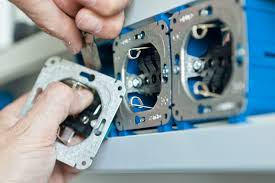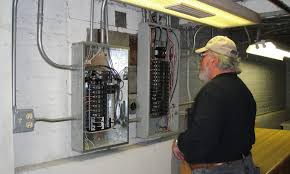SCHEDULE AN INSPECTION
At various stages during construction, inspections must be performed by County staff to ensure the work has been done according to approved plans and building code requirements.
Schedule Inspections
Cancel or Reschedule Inspections
Obtain Inspection Results
Automated System for Plan Review Status and Comments
Inspections must be scheduled by 3 p.m. on the work day prior to the desired date of the inspection. When requesting information or scheduling inspections from the automated phone system, the system will ‘speak’ back to you and provide important information: the permit number, the site address, and the type of inspection. Please listen to this information carefully for verification.
Residential One- and Two-Family (IRC) Inspections for construction of new dwelling units, additions, alterations, and basement finishing using the IRC code are in the Combination Inspection Program. The inspection codes for combination concealment (198) and combination final (199) are under the Building heading.
To Schedule an Inspection
On the Automated Phone System press three to schedule an inspection. When prompted, enter your 6 digit IVR Pin Number, and follow the instructions to enter the inspection code from the listing below. When requested, enter your telephone number.
To Cancel or Reschedule an Inspection
You may use the automated system to cancel inspections until midnight on the workday prior to the scheduled inspection day. On the Automated Phone System, press four to cancel or five to reschedule the inspection and follow the instructions.

Inspections
Why do you need an inspection?
Inspections are part of the approval process and are included in the permit price. Your permit is not complete until your work has passed all required inspections.
Inspectors verify that your completed work meets safety or approval standards and they can assist if you encounter problems with your project. Having permits approved and completed allows future buyers to verify that your work was inspected by The City
Remember, any work completed on your home is ultimately the owner’s responsibility. If you’re working with a contractor, setting your expectations at the beginning of the project in a written contract is a good way to protect your investment.
Please note that City inspections are different from third-party home inspections. We ensure the minimum safety standards of construction and installation are met. For information regarding third-party home inspections
Please ensure all applicable requirements are met prior to the inspection. Please note that the inspection process is dynamic and an inspection outcome depends on the construction method and site conditions at time of inspection. The information provided below is a general list of inspection requirements and is not an exhaustive list.

Inspection Services
In response to national, state, and city declarations of emergency, we are temporarily adjusting how we provide inspection services. Thank you for your understanding and patience during this time. For questions or concerns related to building inspection requests,
Building inspectors will not be performing the following in person inspections:
Any structure where a person is under self or medically ordered quarantine.
All occupied one- or two-family homes and townhouses:
All occupied commercial properties for:
Water heater change outs
HVAC change outs
Minor interior alterations, renovations additions, where the inspector will have to travel through or be in the occupied portion of building.
Boiler replacements
Remote Video Inspections may be possible for:
Basements, additions, remodels and tenant finishes of occupied building
Water heater change outs
HVAC change outs
Basement finish outs
Minor interior alterations, renovations additions, where the inspector will have to travel through or be in the occupied portion of the home.
Boiler replacements
Building inspection will continue to provide inspections for:
All commercial and residential construction projects that are not listed above, this includes but is not limited to:
All new construction
Tenant improvements or tenant finish outs
Interior alterations, renovations and additions where the inspector will not have to travel through or be in the occupied portion of the building.
Inspections necessary to maintain effective operations will be provided for all critical facilities, such as hospitals, nursing homes, Fire, Police, EOC, etc.
Inspections necessary to restore utility interruptions will be provided for essential utilities, such as electrical, gas, water and sewer services.
Inspections will be provided to address structural concerns resulting from incidents such as explosions, fires, vehicles hitting buildings, etc.
Exterior weatherization of building envelopes, such as roofs, veneer, cladding, windows, doors, etc.
Electrical Permits
The purpose of the electrical permit issuance and electrical inspections is to protect the health and safety of people and property from the danger of electrically caused shocks, fires and explosions; to establish a procedure for determining where and by whom electrical installations are to be made; and to ensure that the electrical installations and electrical products made and sold
The Building Codes Bureau provides an Electrical Information Pamphlet to assist in understanding the state electrical requirements. An electrical permit is required for any installation in any new construction, remodeling or repair, except as provided by Section
For information on permit requirements for alternative energy resources such as generators, solar panels, wind energy sources, etc. to power electrical installations or wired structures click here. State electrical permits are required on all electrical work performed
NOTE: Certified local governments may enforce the electrical code within their jurisdictional area. All other areas fall under the State’s jurisdiction. Contact the Building Codes Bureau or local government to determine which jurisdiction you are in.
A homeowner may wire his/her own home, garage and premises using a State homeowner’s electrical permit. Inspections are conducted by State Electrical Inspectors and permits are obtained from the bureau.
Intro To Residential Rough Inspection General
This Electrical Inspection Checklist: Residential Rough Inspection General is engineered to provide an compliant process to guide you in your safety inspections.
As a result of its frequent use, the residential home constitutes one of the more dangerous electrical locations. The sheer number of residential houses mean that fires or other problems resulting from poor wiring practices and other electrical faults pose a serious danger to the public.
The purpose of the residential rough inspection general is to begin to identify the key areas which require checking, and to make sure all electrical systems adhere to appropriate standards.
This process is editable and you can add or remove steps as you please. Each inspection-specific task contains the relevant section reference which applies to the action. It is recommended that you familiarize yourself with the standards before beginning any inspection.
As you work through the checklist, you will encounter form fields where you can enter information and notes in relation to each task. The checklist will save each entry and the data can be accessed from the overview tab on the left-hand column of your template overview